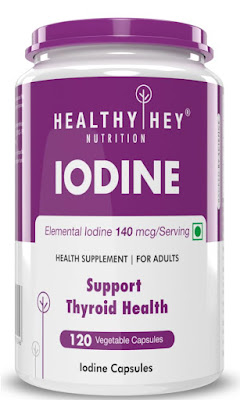Iodine is a trace element that plays an important role in maintaining overall health and well-being. Despite the body requiring it in very small quantities, its importance cannot be underestimated. From regulating thyroid function to supporting cognitive development, iodine is an essential nutrient that influences a variety of physiological processes. Understanding what iodine does for the body highlights its importance in maintaining optimal health.
Regulation of Thyroid Function:
One of the primary functions of iodine is its role in thyroid hormone synthesis. The thyroid gland, located in the neck, produces hormones such as thyroxine (T4) and triiodothyronine (T3), which are important for regulating metabolism, growth, and energy expenditure. Iodine is a major component of these thyroid hormones, without which the thyroid gland cannot function properly. Insufficient iodine intake can lead to thyroid disorders such as hypothyroidism (underactive thyroid) or goiter (enlarged thyroid gland), highlighting the important role of iodine in thyroid health.
Supports cognitive function:
Iodine is essential for normal brain development, especially during pregnancy and early childhood. Thyroid hormones, which are iodine dependent, play an important role in fetal brain development and maturation. Adequate iodine intake during pregnancy is important to prevent cognitive deficits and ensure proper neurological development in the offspring. Similarly, iodine deficiency in infants and young children can impair cognitive function and lead to intellectual disability. Therefore, maintaining adequate iodine levels is essential to maintain optimal brain functioning throughout life.
Regulates metabolism:
Thyroid hormones affect metabolic rate, which affects how the body uses energy from food. By regulating metabolism, iodine indirectly affects weight management and energy levels. An imbalance in thyroid hormone levels due to iodine deficiency or excess can disrupt metabolic processes, leading to symptoms such as weight gain or weight loss, fatigue and changes in body temperature regulation. Thus, adequate iodine intake is essential to maintain a healthy metabolism and overall energy balance.
Supports reproductive health:
Iodine plays a role in reproductive health, especially in women. Thyroid hormones are essential for regulating the menstrual cycle and ovulation. Iodine deficiency can disrupt hormonal balance, leading to irregular menstruation and reproductive problems. Additionally, iodine deficiency during pregnancy increases the risk of complications such as miscarriage, stillbirth and congenital abnormalities in the baby. Pregnant and breastfeeding women need increased iodine intake for their own health and the proper development of their baby's thyroid gland.
Promotes growth and development:
Iodine is important for proper growth and development, especially during infancy, childhood, and adolescence. Thyroid hormones affect bone growth, protein synthesis, and the development of organs and tissues. Insufficient iodine intake can impair children's physical growth and delay developmental milestones. Additionally, iodine deficiency during pregnancy and early childhood can lead to stunted growth and irreversible cognitive impairment. Ensuring adequate iodine intake is essential to support optimal growth and development in individuals of all ages.
Sources of Iodine:
While iodine deficiency remains a global health concern in some areas, obtaining adequate iodine can generally be achieved through diet. Iodized salt, seafood, dairy products, and seaweed are excellent sources of iodine. In areas where iodine deficiency is prevalent, iodine supplementation or fortifying foods with iodine is recommended to prevent iodine-related health problems.
Iodine is an essential nutrient that plays a vital role in a variety of physiological functions, including thyroid function, cognitive development, metabolism, reproductive health, and growth. Maintaining adequate iodine intake through a balanced diet is essential for overall health and well-being throughout life. By understanding the importance of iodine in the body, individuals can take proactive steps to meet their daily iodine requirements and prevent the adverse effects of iodine deficiency.

Comments
Post a Comment